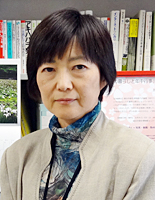How to cultivate the soil of “participating citizens” Masako Nakamura (Professor, Tokyo City University)

Do you know about the “Dessert Election”?
At elementary school lunches, we introduce the appeal of multiple dessert options and let the children vote on which one they would like to eat. The event was primarily aimed at sixth grade elementary school students who learned about elections in social studies class. In some cases, this is done when deciding on a special dessert for the last school lunch before graduation.
It not only teaches students an understanding of how elections work, but also serves as a citizenship education to foster future sovereign citizens who are able to make their own decisions, albeit in a small way. Although efforts are still limited, school lunch menus may be a topic that children can easily consider as ”their own.” Many of the children who participated answered that it was fun.
Although the dessert election is a one-off school event, there are many independent activities that are separate from school education and are being carried out in various places to help children learn about citizenship while having fun. Among them, ”Children’s Town” is very attractive because it allows children to have fun while taking the initiative.
This event is held for a limited time to create a children-only town where there is no need for a large population.Based on mini Munich in Germany, mini Yokohama City, mini Ichikawa, mini Sakura, and Tosakko Town have been created in Japan to prevent the spread of the coronavirus. With due consideration, efforts will be made nationwide in fiscal 2022.
There are big differences between initiatives, but basically the children who run each ”Children’s Town” spend months discussing and deciding on the stores they want to open and the services they need, and when the actual event begins, they decide on the number of people who will be participating on the day. A mayoral election will be held to decide the town’s representatives, including children.
One of the important concepts in the study of political consciousness and behavior is the sense of political efficacy.Broadly speaking, a sense of effectiveness refers to the feeling that ”if we act, we can influence the outcome.” It is thought that when this sense declines, it is likely to lead to abstention and political apathy, with people believing that “my vote is meaningless anyway.”
Unfortunately, if we look at the Japanese data, it is on a long-term downward trend (for example, see NHK’s “Japanese Attitude Survey”).
This concept of sense of effectiveness can be extended to broader subjects such as urban development. Even though they advertise various opportunities through the media and call for participation, many local governments and community development-related organizations have the problem of not being able to attract the most important participants or having a fixed number of members.
There are many factors involved in actually participating in community development, and it is unlikely that it will be determined solely by a sense of effectiveness, but at least one has the sense that if they take action, something might change. This may become the foundation for creating “participating citizens.”
For adults as well, increasing opportunities to experience “their own things” while having fun may seem like a detour, but is actually a shortcut to expanding citizen participation.
